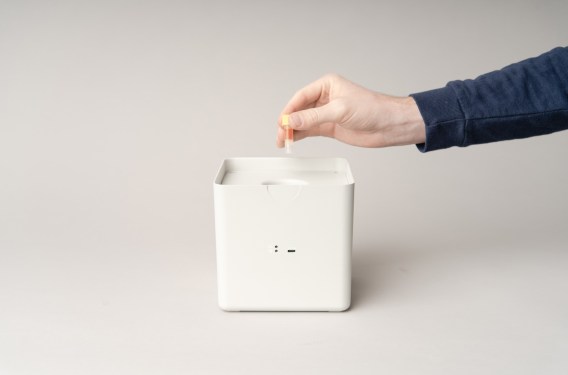Hannah Sieber: The Innovator Behind Artyc, a Game-Changer in Food and Drug Logistics
Introduction
Hannah Sieber, an MIT alumnus and environmental scientist, has carved out a name for herself as a visionary entrepreneur who is redefining the way we think about sustainable logistics. Her latest venture, Artyc, which she founded in 2018, is poised to revolutionize the transportation of food, pharmaceuticals, and other perishable goods by harnessing the power of ice-free refrigeration powered by lithium-ion batteries.
The Transition from EcoFlow to Refrigeration
Before her foray into energy storage systems at EcoFlow, Hannah Sieber had a deeply personal reason for focusing on sustainability. "I grew up in a family where my father was an environmental scientist," she recalls. "He always emphasized the importance of protecting our planet and ensuring that future generations could enjoy the benefits of technology without compromising their health."
This commitment to environmental stewardship led Sieber to EcoFlow, where she co-founded the company in 2013 after working at a startup focused on alternative energy solutions. However, it was during her tenure at EcoFlow that Sieber began to question traditional energy storage methods and explore new ways of ensuring reliable power delivery in remote locations.
One day, while discussing potential applications for lithium-ion batteries with her team, Sieber had an epiphany: "What if we could use the same technology that powers consumer electronics to keep food fresh?" The idea was born—Artyc, a company dedicated to transforming refrigeration through sustainable energy solutions.
The Birth of Artyc
In 2018, Sieber and her team at EcoFlow decided to pivot their focus from battery-powered energy storage to the development of a fully integrated refrigeration system for food and pharmaceutical transport. The challenge was daunting: traditional refrigeration systems rely on propane or natural gas, both of which are finite resources that contribute to climate change and environmental degradation.
Artyc’s solution was simple yet groundbreaking: replace the conventional refrigeration cycle with an ice-free lithium-ion battery-powered system. By using a solid-state heat pump instead of the conventional vapor-compression system, Artyc achieves energy efficiency levels that far exceed those of competing solutions in the market today.
The company quickly became a pioneer in sustainable logistics, working closely with food companies and pharmaceutical manufacturers to pilot their new technology. Sieber’s background as an environmental scientist ensured that Artyc’s products were not only innovative but also meticulously designed to meet strict regulatory standards for safety and performance.
A New Era of Sustainable Food Logistics
Artyc’s success is a testament to the power of innovation in solving complex problems. By eliminating the need for ice, the company has opened up new possibilities for transporting goods that require low temperatures—such as fresh produce, meat, and vaccines— without compromising on performance or environmental impact.
The company’s products are compact, easy-to-use, and capable of operating in a wide range of environments, from the arctic tundra to the tropical rainforests. The Medstow Micro refrigerator, which is currently being tested by health organizations around the world, uses just 1.5 kilowatts of power per day—a figure that equates to the energy consumed by an average household in a single minute!
Artyc’s commitment to sustainability goes beyond its products; Sieber and her team are actively involved in educational campaigns aimed at raising awareness about the importance of preserving our natural resources for future generations. "We believe that sustainable logistics is not just a business opportunity—it’s a moral obligation," she says.
Applications Beyond Healthcare
While Artyc has already found its first customers in the healthcare sector, where precise temperature control is critical, Sieber and her team are looking to expand the range of applications for their technology. For example, they are currently exploring partnerships with food companies such as Impossible Foods and Impossible Project, which aim to revolutionize the way we prepare and consume protein-rich meals.
In addition to its use in medical facilities, Artyc’s refrigeration systems could also play a role in disaster relief operations, where transporting non-perishable goods requires precise temperature control for extended periods.
The Future of Artyc
As Sieber looks ahead, she is optimistic about the potential of her company to reshape the logistics industry. "We are just at the beginning stages," she admits. "There’s a lot of work left to be done in terms of scaling our technology and making it accessible to businesses across all industries."
However, Sieber is confident that Artyc has the right combination of innovation, sustainability, and customer focus to capture a significant share of the market. With her deep understanding of both environmental science and business operations, she is well-positioned to lead the company into an exciting new era of sustainable logistics.
Conclusion
Hannah Sieber’s journey from MIT graduate to cofounder of Artyc is a compelling testament to the power of innovation in addressing global challenges. By rethinking traditional solutions and prioritizing sustainability, she has created a company that not only solves complex problems but also inspires others to follow in her footsteps. As Artyc continues to grow, Sieber remains dedicated to pushing the boundaries of what’s possible and ensuring that future generations can enjoy the benefits of a sustainable world without compromising on quality or performance.



